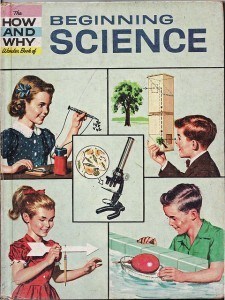
The beauty and wonder of this earth, the expanse of stars in the heavens, the laws by which it is all governed, there is so much to learn and discover! How? What? Why? Science is one of the funnest subjects to teach and do with my children. This is also where I give them free reign {for the most part} in deciding what to learn next. I gave up long ago thinking there was a “right” way to teach science. There isn’t! There is so much to cover I also gave up on thinking we would be able to cover it all. We can’t!
What we can do is take delight in the world around us – the changing seasons, the miracle of our bodies, chemical reactions, and more – and delve into answering questions about everything around us. Most of our science learning has been through questions asked by my children. Another portion of learning has occurred through observing. When was the last time you took your children outside and just quietly sat looking, listening?
What we do/use:
- Ask questions – At the beginning of the school year I ask my children to write down a list of science questions they want to answer.
- Nature Walks – If this can’t be done daily do it weekly at least! Spend time outside just watching and listening. Make sure everyone has a nature journal to document through drawing and writing what they observed that day.
- Lapbooks – A great way to show what children have learned through minibooks displayed in file folders. We usually make a lapbook for anything science related – butterflies, planets, seasons, periodic table, etc.
- Sonlight Science Kits – Planned out by day with books and supplies for science experiments already included these kits are terrific! This is my go-to when there are no “pressing” interests my children want to learn about.
- Online resources – Utilize the wonderful free videos and science documentaries available online! {see a short list below}
Free Resources:
- Homeschool Share – TONS of free lapbook printables and not just for science either.
- Education.com – Thousands of Science worksheets! {other subjects too}
- LearningPage Science Units – geared for k-3 these make great unit studies complete with worksheets, fact files, murals, and lesson plans. Covers oceans, dinosaurs, zoo animals, space, reptiles/amphibians, insects/spiders. Must register but it is completely free. My kids love it!
- MSNucleus – free k-12 science curriculum
- Weather Lessons – from the Weather Channel
- Weather Picture of the Day – from the National Oceanic and Atmospheric Association
- Periodic Table of Videos – click on an element and watch a video about it by a guy that looks like Albert Einstein!
- Bird of the Day
- Astronomy Picture of the Day – from NASA
- Botany Picture of the Day – UBC Botanical Garden
- Biology4Kids
- Chem4Kids
- Physics4Kids
- Cosmos4Kids
- Geography4Kids
- Archeology for Kids

Have you ever tried Thames & Kosmos? They have amazing kits that you can buy, with some lessons and experiments to go along with them. We love them for extended learning. Sometimes, although I love sciece, I don’t know some of the deeper things, or don’t know how to teach it. These kits are a great way to learn these things.
I love science. 🙂
I’m glad you posted this. Science is the subject I haven’t figured out for my kids yet. I’m thinking we’ll do it similarly to the way you do- just study whatever interests us at the moment and try to cover the basics. We talked about the different parts of an insect the other day while weeding and catching bugs. Easy and fun! But some worksheets to go along with it would have been fun.
It seems like I’ve seen a pin on pinterest with science lesson ideas and a list of simple supplies to get to do a whole bunch of science “experiments.” Sounds fun and easy.
I am just wondering how you handle the hands on type classes (like Biology dissections) for your older children. We’ve done an on-line course with our oldest and hope to do one or two with our younger son. While they are in traditional school settings, I like that we can give them an opportunity to delve into a particular topic – earth science, geology, etc.